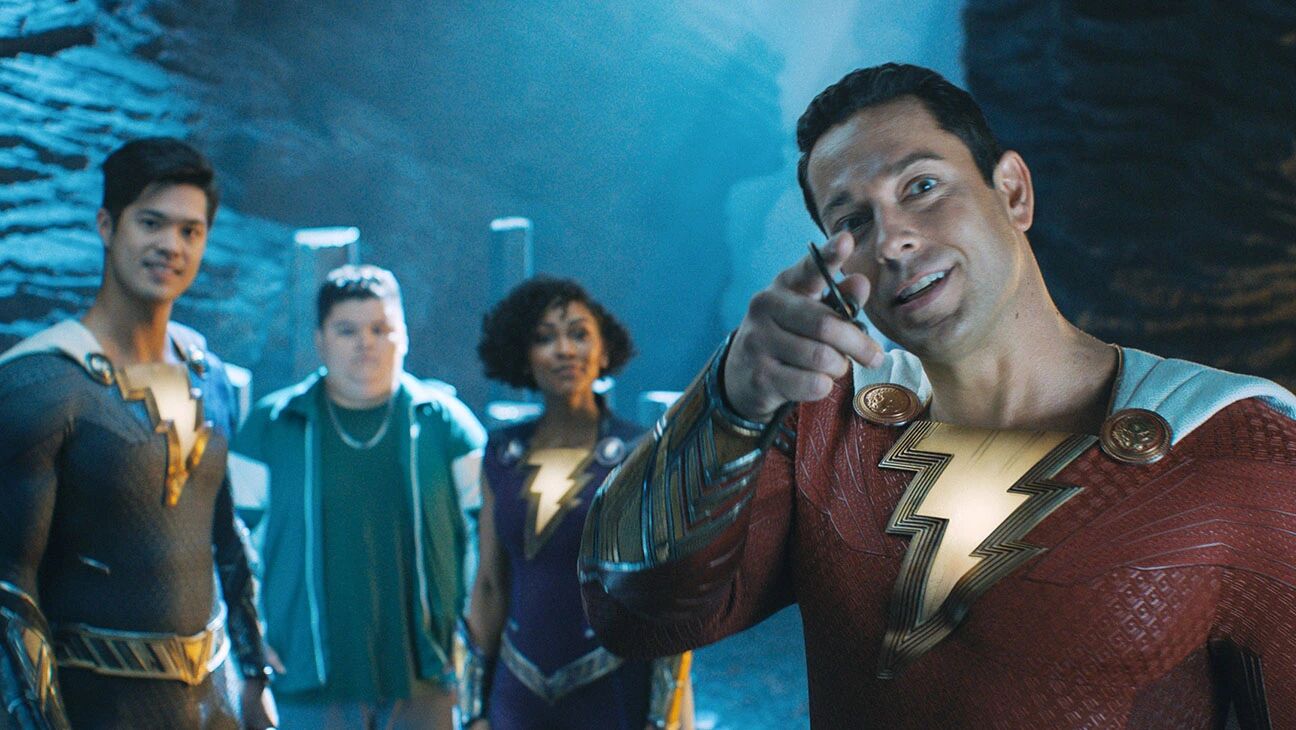Shazam! Fury of the Gods is more disappointing than enraging, and not just because of how it’s fared so far at the box office. What could have been a delightfully camp masterpiece – with Lucy Liu riding an actual dragon! — has just turned out to be a bit naff, really.
You don’t need the wisdom of Solomon to know it wasn’t going to be the best film ever made, but even so, the new Shazam still falls flat for fans of the first movie. Or at least it did for me. Every second Adam Brody and Ross Butler weren’t distracting me with their abs on screen was another moment I’ll never get back.
Muddled plotting and strange Zachary Levi rants aside, there was however one aspect of this sequel that did improve on the first film, albeit not as well as it could have. We are of course talking about the gay stuff. Hot gay stuff, to be specific.
When we first met Shazam’s fellow foster kids four years ago, one scene in particular strongly hinted that one of them might be gay. The moment in question took place when Billy Batson “accidentally” teleported everyone into a strip club. Most of the kids were either shocked or horny or both, but Pedro Peña, played then by Jovan Armand, seemed unfazed, saying, “Not my thing.”
There was one aspect that did improve on the first film. We are of course talking about the gay stuff. Hot gay stuff, to be specific.
Queer fans jumped on this small crumb of representation by immediately welcoming Pedro into the alphabet family, which just goes to show how starved we’ve been in superhero fare up till now.
Ahead of the sequel, Shazam writer Henry Gayden — yes, really — did admit that more could be done though, suggesting that Pedro’s queerness would be handled more openly moving forward (via Dorkaholics):
“The only new addition for this movie is being a lot more forthright about Pedro being gay. And that was hinted at in the first movie very subtly. And I thought it was really important and really, really fought for us including that and bringing that to the fore in this movie.”
So does Pedro’s identity really come “to the fore” in Shazam 2? Well, it’s not like he’s suddenly buying iced coffees or dancing to Carly Rae Jepsen, but moves are definitely made in that direction.
Early on, we find out that Pedro isn’t really into sports, but he is into the half-naked baseball player whose bulge pops up in a sports underwear ad. Shazam, indeed!
A later scene then picks up on this when everyone starts revealing secrets to their foster parents. The main focus is their superpowers, which they’ve been hiding this whole time, but Pedro gets mixed up and decides to declare that he’s sexually aroused by half-naked baseball players.
Ok, he doesn’t use those words exactly, but Pedro does come out, and crucially, the humor of the scene isn’t included at his expense. Everyone’s actually quite supportive and it’s all rather lovely.
Did this scene throw the first brick at Stonewall? No, not quite, but kudos to the writing team for fighting to include it. Given how important family values are to this franchise, it’s nice to see a gay kid accepted here so easily, without question.
There’s still plenty of room for improvement though. Thirsting and coming out are key tenets of the gay experience, it’s true, but both these scenes combined happen faster than you can say “Shazam”. And because of this, they do feel a tad forced.
Admittedly, that’s an issue with the film as a whole, not just these moments. Shazam’s sequel tries to cram way too much into its runtime, like Ross Butler pulling spandex up over that booty. It should come as no surprise that supporting characters like Pedro would end up a bit underdeveloped then, gay or straight. Still, we could have absolutely seen more of this arc play out at some point, and not just because we wanna maximize D.J. Cotrona’s (AKA Adult Pedro’s) screen time.
Anyone who tries to suggest there’s no time for love in superhero films would do well to remember that Billy Batson spends this whole movie thirsting after Wonder Woman, a much older woman, and teen Freddy even goes steady with Anthea, a god who is thousands of years older than him. If there’s time to celebrate these uncomfortable age gaps, there’s enough time for Pedro to get some too.
Unfortunately, we’re not there yet. Blockbuster cinema remains notoriously averse to centering queerness of any kind, something that’s more enraging than disappointing by this point. Still, it doesn’t take the wisdom of Solomon to see how small steps like Pedro’s arc help move Hollywood in the right direction, even if it’s taking too long to reach where we need to be. ♦
Don't forget to share:
Help make sure LGBTQ+ stories are being told...
We can't rely on mainstream media to tell our stories. That's why we don't lock our articles behind a paywall. Will you support our mission with a contribution today?
Cancel anytime · Proudly LGBTQ+ owned and operated
Read More in Entertainment
The Latest on INTO
Subscribe to get a twice-weekly dose of queer news, updates, and insights from the INTO team.
in Your Inbox













